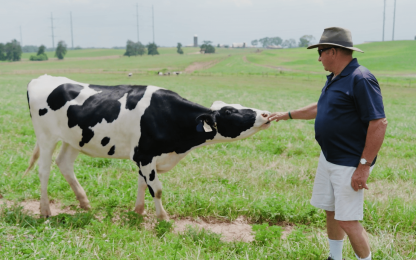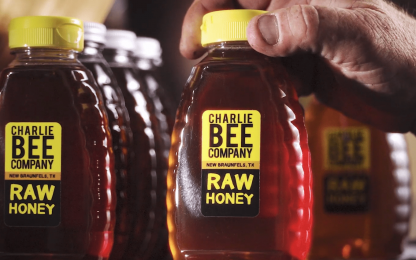Pursuit of a Perfect Almond
The journey of an almond from a sunny California orchard to a grocery store shelf often begins at a family-owned operation like Travaille and Phippen in California’s Central Valley.
Bud Travaille, Dave Phippen and Scott Phippen took on their family’s almond farming and hulling operation in 1980. Over the next four decades, the partners added a sheller, solar panels and almond-processing robots that have boosted efficiency at the operation.
Today, Travaille and Phippen has 60 year-round staff and grows almonds on 1,500 acres. Each year, the vertically integrated business produces about 36 million pounds of almonds, in addition to processing and shipping nuts around the world.
What started as a family farm has evolved into a full-service almond enterprise, with the addition of hulling, shelling and processing facilities. Scott said he and his partners knew they had to adapt the family business in order to stay competitive.
“We Want Ours to be the Best”
Drawing on decades of experience and a deep understanding of the almond hulling and shelling process, Scott and his team are able to quickly spot any issues and ensure they are delivering only top-quality almonds.
“The real beginning is out on the farm,” said Scott. “The grower has to do his job, then the sheller needs to do the next step by not beating up the almonds. We watch the huller-sheller extremely closely. We know how it operates, we understand the machinery and its function.”
Shelling can be a key quality differentiator for the company’s almonds, many of which are destined for export markets in England, Germany, Japan and Dubai, among others.
Nick Gatzman is a member of the family’s fourth generation and a partner at Travaille and Phippen. He said the operation has stayed competitive by bringing on new technology and automation, reducing waste and establishing strong relationships with almond growers who deliver a superior product.
Growing a Zero-Waste Product
Travaille and Phippen turns every part of the almond into a useable product, converting what could be wasted into almond oil and processing the shells for dairy feed.
“There are three products that come out of this building: brown skin almond kernels, almond shell and almond oil,” said Dave Phippen. “All of the byproducts are utilized in this process, and we call ourselves a zero-waste industry. Sometimes when people are critical about almond growing, that it uses too much water, we like to point out that the water didn’t just grow an almond kernel.”
In 2009, they began to install more sustainable infrastructure, including an acre of solar panels on the farm. About a decade later, the family-run operation upgraded the solar panels, which have led to energy-cost savings and a lower carbon footprint.
By adapting the business to be more vertically integrated, process almonds faster with both their trained employees and robots, and run partially on renewable energy sources, Travaille and Phippen has carved out a successful niche in the almond business.
A Strong Partnership
Over the years, Dave said that he and his partners have built a strong relationship with American AgCredit. Travaille and Phippen partnered with American AgCredit for financial expertise as they built new facilities and upgraded equipment for harvesting, sorting and processing almonds.
“I’m pleased that [American AgCredit] is always there for us,” said Dave. “They seem to always be willing to finance our operation. And as my brother and I step back in the operation, I hope we’ve shown the next partners that there’s a real opportunity in financing in a cooperative way.”
This article was originally published by American AgCredit.


